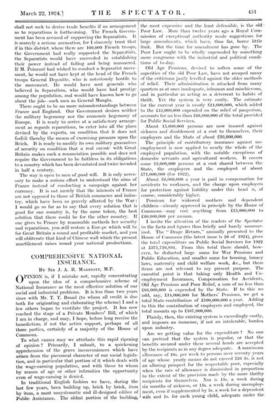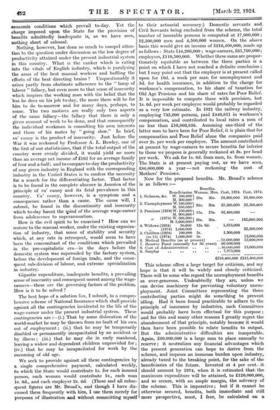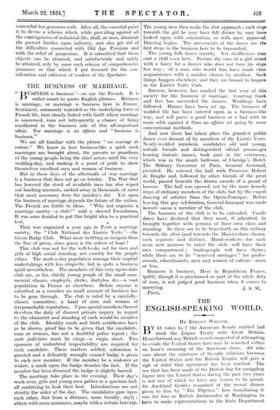COMPREHENSIVE NATIONAL INSURANCE.
BY SIR J. A. R. MARRIOTT, M.P.
O" P 'ION is, if I mistake not, rapidly concentrating upon the idea of a comprehensive scheme of National Insurance as the most effective solution of our social and industrial problems. It is less than two years since with Mr. T. T. Broad (to whom all credit is due both for originating and elaborating the scheme) I and a few others began to ventilate the project. It has now reached the stage of a Private Members' Bill, of which I am in charge, and may, I hope, before long receive the benediction; if not the active support, perhaps of all three parties, certainly of a majority of the House of Commons.
To what causes may we attribute this rapid ripening of opinion ? Primarily, I submit, to a quickening apprehension of the grave inconveniences which have arisen from the piecemeal character of our social legisla- tion, and in particular that portion of it which deals with the wage-earning population, and with those to whom by reason of age or other infirmities the opportunity even of wage-earning is denied.
In traditional English fashion we have, during the last few years, been building up, brick by .brick, item by item, a most unsystematic and ill-designed edifice of Public Assistance.. The oldest portion of the building, the most expensive and the least defensible, is the old Poor Law. More than twelve years ago a Royal Com- mission of exceptional authority made suggestions for large amendments, which have, thus far, borne little fruit. But the time for amendment has gone by. The Poor Law ought to be wholly superseded by something more congruous with the industrial and political condi- tions of to-day.
Old Age Pensions, devised to soften some of the asperities of the old Poor Law, have not escaped many of the criticisms justly levelled against the older methods of relief. Their administration is attacked from many quarters as at once inadequate, inhuman and mischievous, and in particular as acting as a deterrent to habits of thrift. Yet the system is very costly. The estimate for the current year is nearly £24,000,000, which added to the £44,000,000 expended on the relief of pauperism, accounts for no less than £68,000,000 of the total provided for Public Social Services.
About 15,000,000 persons are now insured against sickness and disablement at a cost to themselves, their employers and the .State of about £30,000,000.
The principle of contributory insurance against un- employment is now applied to nearly the whole of the employed population, with the notable exceptions of domestic servants and agricultural workers. It covers some 12,000,000 persons at a cost shared between the State, the employers and the employed of about £71,000,000 (for 1922).
About £6,000,000 a year is paid in compensation for accidents to workmen, and the charge upon employers for protection against liability under this head is, of course, considerably higher.
Pensions for widowed mothers and dependent children—already approved in principle by the House of Commons—may cost anything from £15,000,000 to £40,000,000 Per annum.
I invite the attention of the readers of the Spectator to the facts and figures thus briefly and barely summar- ized. The " Drage Return," annually presented to the House of Commons (the latest issue is 26 of 1924), gives the total expenditure on Public Social Services for 1922 at £371,716,891. From this total there should, how- ever, be deducted large sums for War Pensions and Public Education, and smaller sums for housing, lunacy laws, maternity and child welfare work, &c., but these items are not relevant to my present purpose. The essential point is that taking only Health and Un- employment Insurance, Compensation for Accidents, Old Age Pensions and Poor Relief, a sum of no less than £86,000,000 is expended by the State. If to this we add, say, 1/4,000,000 for Mothers' Pensions, we get a total State contribution of £100,000,000 a year. Adding to this the contribution of employers and employed, the total mounts up to £187,000,000.
Plainly, then, the existing system is exceedingly costly, and imposes an immense, if not an intolerable, burden upon industry.
Are we getting value for the expenditure ? No one can pretend that the system is popular, or that the benefits secured under these several heads are accepted by the recipients as in any degree adequate. A maximum allowance of 10s. per week to persons over seventy years of age whose yearly means do not exceed £26 5s. is not an alluring prospect for the respectable poor, especially when the rate of allowance is diminished in proportion to the extent of the provision made by the more thrifty recipients for themselves. Nor is 15s. a week during six months of sickness, or 15s. a week during unemploy- ment, even if supplemented by 5s. a week for a dependent wife and Is. for each young child, adequate under the economic conditions which prevail to-day. Yet the charge imposed upon the State for the provision of benefits admittedly inadequate is, as we have seen, nothing short of colossal.
Nothing, however, has done so much to compel atten- tion to the question under discussion as the low degree of productivity attained under the present industrial system in this country. What is the canker which is eating into the vitals of English industry, which is paralysing the arms of the best manual workers and baffling the efforts of the best directing brains ? Unquestionably it arises partly from obstinate adherence to the " lump of labour " fallacy, but even more to that sense of insecurity which inspires the working man with the belief that the less he does on his job to-day, the more there will be for him to do to-morrow and for many days, perhaps, to come. The two motives are really only two aspects of the same fallacy-the fallacy that there is only a given amount of work to be done, and that consequently the individual workman is consulting his own interests and those of his mates by " going slow." In brief; ca' canny is the product of insecurity. Just before the War it was reckoned by Professor A. L. Bowley, one of the first of our statisticians, that if the total output of the country were evenly divided, it would yield no more than an average net income of £162 for an average family of four and a-half; and to compare to-day the productivity of any given industry in. England with the corresponding industry in the United States is to confess the necessity for a search for the differentiating factor. That factor is to be found in the complete absence in America of the principle of ca' canny and its fatal prevalence in this country. Ca' canny, however, is a symptom and a consequence rather than a cause. The cause will, I submit, be found in the discontinuity and insecurity which to-day haunt the wind of the average wage-earner from adolescence to superannuation.
How is the evil spirit to be exorcised ? How can we restore to the manual worker, under the existing organiza- tion of industry, that sense of stability and security which, at any rate in retrospect, would seem to have been the concomitant of the conditions which prevailed in the pre-capitalistic era-in the days before the domestic system was superseded by the factory system, before the development of foreign trade, and the conse- quent sub-division of labour, and extreme specialization in industry.
Gigantic expenditure, inadequate benefits, a prevailing sense of insecurity and consequent unrest among the wage- earners-these are the governing factors of the problem. How is it to be solved ?
The best hope of a solution lies, I submit, in a compre- hensive scheme of National Insurance which shall provide against all the contingencies incidental to the life of the wage-earner under the present industrial system. These contingencies are :-(i.) That by some dislocation of the world-market he may be thrown from no fault of his own out of employment ; (ii.) that he may be temporarily disabled or permanently incapacitated by an accident or by illness ; that he may die in early manhood, leaving a widow and dependent children unprovided for ; (iv.) that he may be incapacitated for work by the oncoming of old age.
We seek to provide against all these contingencies by a single comprehensive payment, calculated weekly, to which the State would contribute ls. for each insured person, each woman would contribute ls., each man Is. 6d., and each employer 2s. 6d. (These and all subse- quent figures are Mr. Broad's, and though I have dis- cussed them frequently with him, I use them merely for purposes of illustration and without committing myself to their actuarial accuracy.) Domestic servants and, Civil Servants being excluded from the scheme, the total number of insurable persons is computed at 17,000,000 ; 12,500,000 men and 4,500,000 women. On the above basis this would give an income of £216,400,000, made up as follows : State £44,200,000 ; wage-earners, 161,700,000 ; employers, £110,500,000. Whether these sums are propor- tionately equitable as between the three parties is a point on which I have not reached a definite conclusion ; but I may point out that the employer is at present called upon for 10d. a week per man for unemployment and 5d. for health insurance, in addition to the charge for. workmen's compensation, to his share of taxation for Old Age Pensions and his share of rates for Poor Relief. It is impossible to compute these with precision, but ls. 6d. per week per employee would probably be regarded as a very low estimate. In 1921 the railway industry, employing 735,000 persons, paid £440,851 in workmen's compensation, and contributed to local rates a sum of no less than £10,803,858. Assuming one-third of the; latter sum to have been for Poor Relief, it is plain that for compensation and Poor Relief alone the companies paid over 2s. per week per employee. The amount contributed at present by wage-earners to secure benefits far inferior to those we propose is generally reckoned at 8s. per head per week. We ask for ls. 6d. from men, is. from women. The State is at present paying out, as we have seen, £86,000,000 a year -not reckoning the cost of Mothers' Pensions., Now for the proposed benefits. Mr. Broad's scheme is as follows :-
Benefits.
Beneficiaries. Women. Men. Cost, 1924. Cost, 1974.
1. Sickness, &c.
Wm: 3001°°:001 20s. 30s.
28,800,000 28,600,000
2. 'Unemployment W,100,000}
M. 350,000 20s. 30s,
32,500,000 32,500,000
3. Pensions (1924) W. 19"043} 15s 25s. M. 900,000 •
62,400,000 -
„ (1974) W. 500,0°41- 20s. 308.
M. 2,000,000 - 182,000,000 4. Widows (1924) 50,000 12s. 6d. 1,625,000
(1974) 1,000,000 32,500,000
5. Children (1924) 100,000 5s. 1,300,000
(to 15) (1974) 1,000,000 5s.
13,000,000 6. Medical Benefits (as at present) 12,000,000 12,000,000 7. Reserve Fund. (annually -for 50. years) 80,006;000
8. Cost of Administration -10,000,000 15,000,000 9. Surplus .. .. 7,975,000
£216,400,000 £315,600,000
This scheme offeri a large target for criticism, and my hope is that it will be widely and closely- criticized. There will be some who regard the unemployment benefits as over-generous. Undoubtedly they are, unless we can devise machinery for preventing voluntary unem- ployment. Joint Committees representing the three. contributing parties might do something to prevent idling. Had it been found practicable to adhere to the principle of insurance by industries, such Committees would probably have been effectual for this purpose ; and for this and many other reasons I greatly regret the abandonment of that principle, notably because it would then. have been possible to relate benefits to output. But the administrative difficulties are insuperable. Again, £60,000,000 is a large sum to place annually to reserve ; it neutralizes any financial advantages which the present generation can hope to derive from the scheme, and imposes an immense burden upon industry, already taxed to the breaking point for the sake of the beneficiaries of the future. Invested at 4 per cent. it should amount by 1974, when it is .estimated that: the maximum expenditure will be attained, to 1120,000,000, and so secure, with an ample margin, the solvency of the scheme. This is imperative ; but if it cannot be otherwise secured, benefits, both immediate and still more prospective, must, I fear, be . calculated on a somewhat less generous scale. After all, the essential point is to devise a scheme which, while providing against all the contingencies of industrial life, shall, at once, diminish the present burden upon industry, and also get rid of the difficulties connected • with Old Age Pensions and with the relief of pauperism. It is submitted that these objects can be attained, and satisfactorily and safely be attained, only by some such scheme of comprehensive insurance as that which I put forward for the con- sideration- and criticism of readers of the Spectator.
















































 Previous page
Previous page